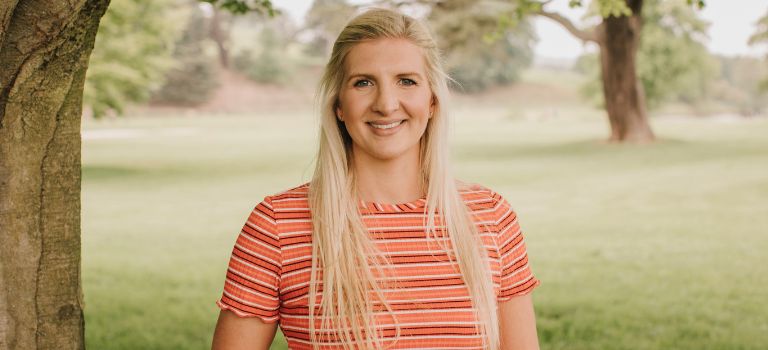Rebecca’s story: my journey to a coeliac disease diagnosis
Rebecca Adlington OBE, a former elite swimmer, is one of Great Britain’s most successful Olympians and a double Olympic gold medallist. She has won multiple Olympic, World, Commonwealth, and European medals and famously broke the 800m freestyle world record at just 19 during the 2008 Beijing Olympics.
Since retiring from competitive swimming, Rebecca has shifted her focus to media, and she’s also set up a learn-to-swim programme to help children acquire vital swimming skills. Despite these accomplishments, Rebecca was simultaneously facing an ongoing battle with her health.
Living with symptoms without knowing the cause
For years, Rebecca experienced a range of symptoms that she could never explain.
“I had stomach pain, unexplained fatigue, mouth ulcers, bloating, and constantly felt run down,” she recalls. “I also suffered two miscarriages, and while I can’t say for certain they were caused by coeliac disease, it was these losses that eventually led to me being tested.”
Like many others living with undiagnosed coeliac disease, Rebecca’s symptoms were dismissed or attributed to other causes. “The fatigue was overwhelming, I didn’t feel as productive as others, and I had to go to bed early but still woke up exhausted,” she adds. “The mouth ulcers made eating painful, and I had no choice but to avoid certain foods. The stomach pain was persistent, and no one could explain why.”
Seeking answers
Despite the mounting health issues, Rebecca never suspected coeliac disease.
“I never even thought it could be coeliac disease,” she admits. I wish I had asked my doctors to test me sooner.”
Finally, after years of suffering, Rebecca was tested for coeliac disease.
"It’s really important to keep gluten in the diet throughout the diagnosis process to ensure that the tests are accurate. In October 2024, at the age of 35, she received a diagnosis of coeliac disease. "It was life-changing," Rebecca says. "Finally, I had an answer to all of the issues I had been struggling with for so long."
Adjusting to a gluten free life
Adapting to a gluten free diet was a big adjustment for Rebecca.
"I’ve had to make a lot of changes," she says. "It’s a challenge, but the improvements in my health have been incredible. My energy is up, I’m no longer in pain, and I feel so much better overall."
Rebecca quickly realised that living with coeliac disease meant making significant adjustments.
“I struggle to eat out now. When I travelled through Manchester Airport in November, the only thing I could find to eat was one salad. If I want to eat at a restaurant, I have to check the menu in advance, sometimes calling ahead. And when I do order, I sometimes feel like I’m being fussy rather than having a medical requirement.”
Despite the difficulties, Rebecca has also experienced the positives of switching to a gluten free diet.
“Since removing gluten, I have been feeling significantly better. My mood has improved, my energy levels are up, and most importantly, I’m not in pain anymore. I feel better now that I'm not constantly bloated, and I can exercise more.”
Advice for others
Following her coeliac disease diagnosis, Rebecca wants to encourage others who might be experiencing similar symptoms to seek help.
“Use Coeliac UK’s self-assessment and ask your GP for a test. I wish I had done it sooner. If you think gluten might be affecting you, don’t just cut it out, get tested first. It’s really important to keep gluten in the diet throughout the diagnosis process.”
She also found support through Coeliac UK
“After I shared my diagnosis on social media, so many people recommended Coeliac UK to me. It was also the first thing that came up when I searched online. The information has been incredibly helpful in guiding me through this huge life change.”
Why Coeliac Awareness Month matters
Rebecca’s story is just one of many highlighting the long road to a coeliac diagnosis. Currently, only 36% of people with coeliac disease are diagnosed, meaning an estimated 500,000 people in the UK could be living with the condition without knowing it. The average time it takes for someone to receive a diagnosis is 13 years from the onset of symptoms.
Coeliac Awareness Month aims to reach those who might be living with undiagnosed coeliac disease and help them take the first step toward diagnosis and better health. We’re urging those affected by it to recognise symptoms and complete the free online self-assessment and take the first step on the road to recovery.
Rebecca is encouraging others to seek help if they suspect gluten might be affecting their health.
“If you’re experiencing symptoms like I had, make sure to keep gluten in your diet but ask your doctor for a test. I wish I had done it sooner. The earlier you get tested, the sooner you can start living a healthier life."
Rebecca’s experience proves that early diagnosis and a gluten free diet can have life-changing benefits. If you relate to Rebecca’s symptoms, take our free
